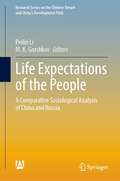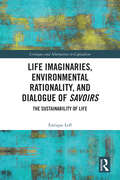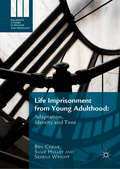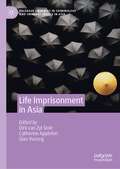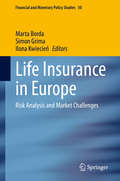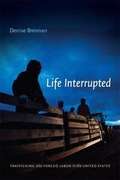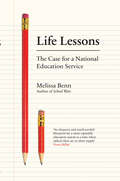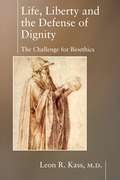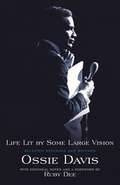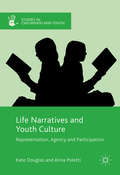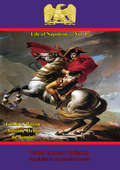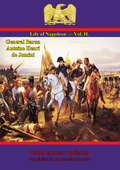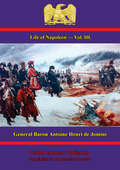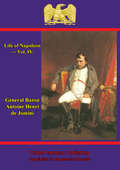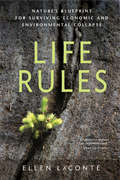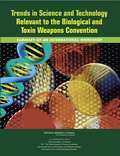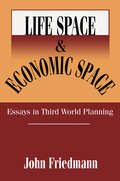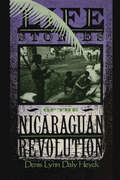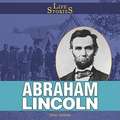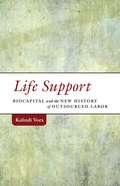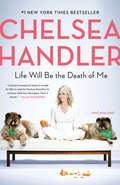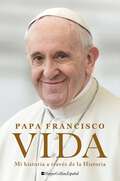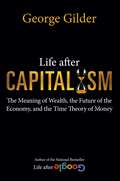- Table View
- List View
Life Expectations of the People: A Comparative Sociological Analysis of China and Russia (Research Series on the Chinese Dream and China’s Development Path)
by Peilin Li M. K. GorshkovThis book compares the Chinese and Russian dreams, focusing on eight aspects: prosperity, affluence, family harmony, fairness and justice, diversity, green beauty, honesty and uprightness, and happiness. Based on large-scale survey data combined with the corresponding sociological theory for analysis, it presents detailed information, compelling arguments, and well-founded conclusions, offering insights into the commonalities and differences between these two countries' dreams.
Life Imaginaries, Environmental Rationality, and Dialogue of Savoirs: The Sustainability of Life (Critiques and Alternatives to Capitalism)
by Enrique LeffShifting from the idea that our current ‘environmental question’ arises from the history of metaphysics and its focus on ‘Being’ over ‘Life’—and the attendant explorations of the thought of Heidegger and Heraclitus—this book unfolds a philosophical and sociological proposal for transitioning toward the sustainability of life.With a focus on the imaginaries of life of indigenous peoples, it moves from political ecology to a political ontology, centered on the territorial, cultural, and existential rights of various peoples of the Earth. Arguing for an environmental rationality founded on three principles—the diversity of life, a politics of difference, and an ethics of otherness—it calls for a dialogue of knowledge in a world of manifold worlds, for an historical transition toward sustainability of life on our planet.It will therefore appeal to scholars of sociology, philosophy, and political theory working on questions of social and environmental justice, sustainability, and alternatives to capitalism.
Life Imprisonment from Young Adulthood: Adaptation, Identity and Time (Palgrave Studies in Prisons and Penology)
by Ben Crewe Susie Hulley Serena WrightThis book analyses the experiences of prisoners in England & Wales sentenced when relatively young to very long life sentences (with minimum terms of fifteen years or more). Based on a major study, including almost 150 interviews with men and women at various sentence stages and over 300 surveys, it explores the ways in which long-term prisoners respond to their convictions, adapt to the various challenges that they encounter and re-construct their lives within and beyond the prison. Focussing on such matters as personal identity, relationships with family and friends, and the management of time, the book argues that long-term imprisonment entails a profound confrontation with the self. It provides detailed insight into how such prisoners deal with the everyday burdens of their situation, feelings of injustice, anger and shame, and the need to find some sense of hope, control and meaning in their lives. In doing so, it exposes the nature and consequences of the life-changing terms of imprisonment that have become increasingly common in recent years.
Life Imprisonment in Asia (Palgrave Advances in Criminology and Criminal Justice in Asia)
by Catherine Appleton Dirk van Zyl Smit Giao VucongLife imprisonment is the punishment most often imposed worldwide for what societies regard as the most serious offences. Yet, in Asia the phenomenon has never been studied systematically. Life Imprisonment in Asia fills this major gap. It brings together thirteen new essays on life imprisonment in key jurisdictions in the region. Each chapter consolidates what is known about the law and practice of life imprisonment in the jurisdiction and then explores aspects of the imposition or implementation of life sentences that the authors regard as particularly problematic. In some instances, the main issue is the imposition of life sentences by the courts and their relationship to the death penalty. In others, the focus is on the treatment of life sentenced prisoners. In many instances, the most prominent question is whether life sentenced prisoners should be released and, if so, according to what processes. In the overview chapter, the editors place the complex picture that emerges of life imprisonment in Asia in a global context and point to reforms urgently required to ensure that Asian life sentences meet international human rights standards.Life Imprisonment in Asia should be read by everyone who has an interest in just punishments for serious offences, not only in Asia, but throughout the world. It will be an invaluable tool for lawyers, criminologists, policy makers and penal reform advocates in the region and beyond.
Life Insurance in Europe: Risk Analysis and Market Challenges (Financial and Monetary Policy Studies #50)
by Simon Grima Marta Borda Ilona KwiecieńThis book examines the challenges for the life insurance sector in Europe arising from new technologies, socio-cultural and demographic trends, and the financial crisis. It presents theoretical and applied research in all areas related to life insurance products and markets, and explores future determinants of the insurance industry’s development by highlighting novel solutions in insurance supervision and trends in consumer protection. Drawing on their academic and practical expertise, the contributors identify problems relating to risk analysis and evaluation, demographic challenges, consumer protection, product distribution, mortality risk modeling, applications of life insurance in contemporary pension systems, financial stability and solvency of life insurers. They also examine the impact of population aging on life insurance markets and the role of digitalization. Lastly, based on an analysis of early experiences with the implementation of the Solvency II system, the book provides policy recommendations for the development of life insurance in Europe.
Life Interrupted: Trafficking into Forced Labor in the United States
by Denise BrennanLife Interrupted introduces us to survivors of human trafficking who are struggling to get by and make homes for themselves in the United States. Having spent nearly a decade following the lives of formerly trafficked men and women, Denise Brennan recounts in close detail their flight from their abusers and their courageous efforts to rebuild their lives. At once scholarly and accessible, her book links these firsthand accounts to global economic inequities and under-regulated and unprotected workplaces that routinely exploit migrant laborers in the United States. Brennan contends that today's punitive immigration policies undermine efforts to fight trafficking. While many believe trafficking happens only in the sex trade, Brennan shows that across low-wage labor sectors--in fields, in factories, and on construction sites--widespread exploitation can lead to and conceal forced labor. Life Interrupted is a riveting account of life in and after trafficking and a forceful call for meaningful immigration and labor reform.All royalties from this book will be donated to the nonprofit Survivor Leadership Training Fund administered through the Freedom Network.
Life Lessons: The Case for a National Education Service
by Melissa BennA radical agenda to make our education system fit for the twenty-first centuryOur education system has been damaged by politicians who have arrogantly imposed a regime of market-driven reforms. It is time to reframe education as an essential public good, one arising from a hunger to find more engaging ways to learn and the powerful imperative to make our society genuinely equal.In this timely and provocative essay, Melissa Benn argues for a National Education Service. Like the NHS, the NES would provide the framework for a life-long entitlement to education: from early-years provision to apprenticeships, universities and adult education. It should be free at the point of delivery. It should nurture teachers and scholarship, moving beyond an obsession with exam results to create fully rounded, questioning citizens. Its eventual aim should be an integrated, comprehensive system available to all.
Life Liberty & the Defense of Dignity
by Leon KassAt the onset of Life, Liberty and the Defense of Dignity, Leon Kass gives us a status report on where we stand today: "Human nature itself lies on the operating table, ready for alteration, for eugenic and psychic 'enhancement,' for wholesale redesign. In leading laboratories, academic and industrial, new creators are confidently amassing their powers and quietly honing their skills. For anyone who cares about preserving our humanity, the time has come for paying attention." Trained as a medical doctor and biochemist, Dr. Kass has become one of our most provocative thinkers on bioethical issues. In Life, Liberty and the Defense of Dignity, he has written a book that grapples with the moral meaning of the new biomedical technologies now threatening to take us back to the future envisioned by Aldous Huxley in Brave New World. In a series of mediations on cloning, embryo research, the sale of organs, and the assault on mortality itself, Kass questions the wisdom of trying to break down the natural boundaries given us and to remake the human body into an instrument of our will. He also attempts to chart a course by which we might avoid the dehumanization of biotechnical "recreationism" without rejecting modern science or rejecting its genuine contributions to human welfare. Leon Kass writes profoundly about the limits of science and the limits of life, about what makes us human and gives us human dignity. Life, Liberty and the Defense of Dignity.
Life Lit by Some Large Vision
by Ruby Dee Ossie DavisOssie Davis, the celebrated civil rights activist, actor, writer, and director, is remembered for a film, television, and stage career of more than half a century. His awards include an Emmy Award, an NAACP Image Award for his work in the Spike Lee film Do the Right Thing, a Lifetime Achievement Award from the Screen Actors Guild, and a Kennedy Center Honor. The last two honors, like so many of his accomplishments, were shared with his wife and partner (in life and in work), Ruby Dee. Ossie Davis is also revered for his lifelong commitment to those social and political causes about which he was so passionate. Of all the gifts he possessed, perhaps none was greater than his ability to articulate the important issues of the day. He used his brilliant mind and his oratory skills to give voice to his concerns as a black man, an American, and a human being in the world, as well as to the individuals and communities whose concerns he made his own. This monumental book brings together many of the moving speeches, essays, and other writings as an ultimate gift to posterity. Life Lit by Some Large Vision includes some humor, some history, and some surprises: moving tributes to such luminaries as Malcolm X and Louis Armstrong; thought-provoking speeches on the treachery of the English language and the challenge of breaking through the "niggerization" process; letters to friends and fellow thinkers; essays that span decades of social thought and revolutionary positions; and the closing monologue from his groundbreaking 1961 play, Purlie Victorious. The unforgettable sound of Ossie Davis's voice is well documented in his work on film and television, but the words on these pages offer his heart and mind, and will be the next best thing to witnessing him speak in person. Ruby Dee contributes a foreword to the collection and introductory notes to the individual pieces, many of which were written and delivered with her at his side. The result is a comprehensive celebration of one man's extraordinary wisdom and generosity. This is a book that will enrich countless readers -- as a gift, an educational resource, a volume to be read aloud on special occasions, and much more.
Life Narratives and Youth Culture: Representation, Agency and Participation (Studies in Childhood and Youth)
by Kate Douglas Anna Poletti<P>This book considers the largely under-recognised contribution that young writers have made to life writing genres such as memoir, letter writing and diaries, as well as their innovative use of independent and social media. The authors argue that these contributions have been historically silenced, subsumed within other literary genres, culturally marginalised or co-opted for political ends. Furthermore, the book considers how life narrative is an important means for youth agency and cultural participation. <P><P>By engaging in private and public modes of self-representation, young people have contested public discourses around the representation of youth, including media, health and welfare, and legal discourses, and found means for re-engaging and re-appropriating self-images and representations. <P>Locating their research within broader theoretical debates from childhood and youth studies: youth creative practice and associated cultural implications; youth citizenship and autonomy; the rights of the child; generations and power relationships, Poletti and Douglas also position their inquiry within life narrative scholarship and wider discussions of self-representation from the margins, representations of conflict and trauma, and theories of ethical scholarship.
Life Of Napoleon — Vol. I. (Life Of Napoleon #1)
by General Baron Antoine Henri de Jomini General H. W. HalleckThe life of Napoleon is etched still across the history of Europe, in the wars he waged, the dynasties that he toppled, and the laws he enacted. Even in an epoch rich in social change, from the bottom up he remains a fascinating figure; biographers face the challenge of doing justice to such a multi-faceted character. Few can have been said to have access to the Emperor as much as the generals that served under him throughout his many campaigns; General Jomini spent many year serving the Emperor and many more in the company of some of his enemies putting him in an excellent position to write his biography. Written as if by Napoleon himself, Jomini traces Napoleon's political and military successes and failures, weaving them into a seamless narrative that makes his work one of the few rounded biographies of Napoleon.This first volume covers Napoleon's early years from birth in Ajaccio in Corsica to his ascent to the Consulship and the peace of Amiens in 1802.Of the Author -- General Jomini saw much service during the Napoleonic Wars, initially working in staff positions for Marshal Ney prior to being attached to the Emperor's own headquarters during the 1806 and 1807 campaigns. He was pushed out of the Grande Armée into the arms of the Russian service in 1813, becoming aide-de-camp to the Tzar. He was famous for his copious output of works on the military theory and strategy employed during the French Revolution, the Napoleonic Wars, and even those of Frederick the Great. He is often remembered for his chef d'œuvre, the "Art of War", and has been dubbed the "founder of modern strategy" by historian John Shy.Author -- General Baron Antoine Henri de Jomini (1779-1869)Translator -- General H. W. Halleck (1815-1872
Life Of Napoleon — Vol. II. (Life Of Napoleon #2)
by General Baron Antoine Henri de Jomini General H. W. HalleckThe life of Napoleon is etched still across the history of Europe, in the wars he waged, the dynasties that he toppled, and the laws he enacted. Even in an epoch rich in social change, from the bottom up he remains a fascinating figure; biographers face the challenge of doing justice to such a multi-faceted character. Few can have been said to have access to the Emperor as much as the generals that served under him throughout his many campaigns; General Jomini spent many year serving the Emperor and many more in the company of some of his enemies putting him in an excellent position to write his biography. Written as if by Napoleon himself, Jomini traces Napoleon's political and military successes and failures, weaving them into a seamless narrative that makes his work one of the few rounded biographies of Napoleon.This second volume covers the campaigns of Austerlitz, Jena, Eylau and Friedland and the beginnings of the Peninsular War.Of the Author -- General Jomini saw much service during the Napoleonic Wars, initially working in staff positions for Marshal Ney prior to being attached to the Emperor's own headquarters during the 1806 and 1807 campaigns. He was pushed out of the Grande Armée into the arms of the Russian service in 1813, becoming aide-de-camp to the Tzar. He was famous for his copious output of works on the military theory and strategy employed during the French Revolution, the Napoleonic Wars, and even those of Frederick the Great. He is often remembered for his chef d'œuvre, the "Art of War", and has been dubbed the "founder of modern strategy" by historian John Shy.Author -- General Baron Antoine Henri de Jomini (1779-1869)Translator -- General H. W. Halleck (1815-1872)
Life Of Napoleon — Vol. III. (Life Of Napoleon #3)
by General Baron Antoine Henri de Jomini General H. W. HalleckThe life of Napoleon is etched still across the history of Europe, in the wars he waged, the dynasties that he toppled, and the laws he enacted. Even in an epoch rich in social change, from the bottom up he remains a fascinating figure; biographers face the challenge of doing justice to such a multi-faceted character. Few can have been said to have access to the Emperor as much as the generals that served under him throughout his many campaigns; General Jomini spent many year serving the Emperor and many more in the company of some of his enemies putting him in an excellent position to write his biography. Written as if by Napoleon himself, Jomini traces Napoleon's political and military successes and failures, weaving them into a seamless narrative that makes his work one of the few rounded biographies of Napoleon.This third volume covers the campaigns of Wagram, the continuing Spanish Ulcer and the beginnings of the Russian campaign in 1812.Of the Author -- General Jomini saw much service during the Napoleonic Wars, initially working in staff positions for Marshal Ney prior to being attached to the Emperor's own headquarters during the 1806 and 1807 campaigns. He was pushed out of the Grande Armée into the arms of the Russian service in 1813, becoming aide-de-camp to the Tzar. He was famous for his copious output of works on the military theory and strategy employed during the French Revolution, the Napoleonic Wars, and even those of Frederick the Great. He is often remembered for his chef d'œuvre, the "Art of War", and has been dubbed the "founder of modern strategy" by historian John Shy.Author -- General Baron Antoine Henri de Jomini (1779-1869)Translator -- General H. W. Halleck (1815-1872)
Life Of Napoleon — Vol. IV. (Life Of Napoleon #4)
by General Baron Antoine Henri de Jomini General H. W. HalleckThe life of Napoleon is etched still across the history of Europe, in the wars he waged, the dynasties that he toppled, and the laws he enacted. Even in an epoch rich in social change, from the bottom up he remains a fascinating figure; biographers face the challenge of doing justice to such a multi-faceted character. Few can have been said to have access to the Emperor as much as the generals that served under him throughout his many campaigns; General Jomini spent many year serving the Emperor and many more in the company of some of his enemies putting him in an excellent position to write his biography. Written as if by Napoleon himself, Jomini traces Napoleon's political and military successes and failures, weaving them into a seamless narrative that makes his work one of the few rounded biographies of Napoleon.This fourth volume covers the disastrous effects of the Russian campaign, the fight in Germany of 1813, his downfall in 1814 and his final defeat at Waterloo.Of the Author -- General Jomini saw much service during the Napoleonic Wars, initially working in staff positions for Marshal Ney prior to being attached to the Emperor's own headquarters during the 1806 and 1807 campaigns. He was pushed out of the Grande Armée into the arms of the Russian service in 1813, becoming aide-de-camp to the Tzar. He was famous for his copious output of works on the military theory and strategy employed during the French Revolution, the Napoleonic Wars, and even those of Frederick the Great. He is often remembered for his chef d'œuvre, the "Art of War", and has been dubbed the "founder of modern strategy" by historian John Shy.Author -- General Baron Antoine Henri de Jomini (1779-1869)Translator -- General H. W. Halleck (1815-1872)
Life Rules
by Ellen LaconteCorporate capitalism has ravaged the planet the same way HIV ravages the human body, triggering a critical mass of cascading environmental, economic, social, and political crises. Economic and climate instability, collapsing ecosystems, peak fossil fuels, and devastating resource wars--if the Earth were a patient, her condition would be critical. Life Rules offers a comprehensive analysis of our present circumstances, combined with a holistic treatment protocol for restoring health to vulnerable human and natural communities. Predicting that Life will last, but if we don't make some fundamental changes, life as we know it--and a lot of us--won't, Life Rules identifies natural laws that have allowed non-human communities to thrive and prosper for several billion years, including: Local self-reliance Mutual interdependence Reliance on non-fossil sources of energy Resource conservation, sharing, and recycling Radically democratic self-organization and governance This sobering yet essentially optimistic manifesto is required reading for anyone concerned about our ability to live within Earth's means. A powerful tool for community transition and cultural transformation, Life Rules offers a solution to our global challenges that is at once authentically hopeful, deeply inspiring, and profoundly liberating. Ellen LaConte is acting director of the EarthWalk Alliance, a contributing editor to Green Horizon Magazine and The Ecozoic, a frequent talk show guest, and publisher of the Starting Point online newsletter. She has written two books about Helen and Scott Nearing, homesteaders and best-selling authors of Living the Good Life, and she is the author of the upcoming environmental novel Afton.
Life Sciences and Related Fields
by International Union of Biochemistry Molecular BiologyDuring the last decade, national and international scientific organizations have become increasingly engaged in considering how to respond to the biosecurity implications of developments in the life sciences and in assessing trends in science and technology (S&T) relevant to biological and chemical weapons nonproliferation. The latest example is an international workshop, Trends in Science and Technology Relevant to the Biological Weapons Convention, held October 31 - November 3, 2010 at the Institute of Biophysics of the Chinese Academy of Sciences in Beijing. Life Sciences and Related Fields summarizes the workshop, plenary, and breakout discussion sessions held during this convention. Given the immense diversity of current research and development, the report is only able to provide an overview of the areas of science and technology the committee believes are potentially relevant to the future of the Biological and Toxic Weapons Convention (BWC), although there is an effort to identify areas that seemed particularly ripe for further exploration and analysis. The report offers findings and conclusions organized around three fundamental and frequently cited trends in S&T that affect the scope and operation of the convention: The rapid pace of change in the life sciences and related fields; The increasing diffusion of life sciences research capacity and its applications, both internationally and beyond traditional research institutions; and The extent to which additional scientific and technical disciplines beyond biology are increasingly involved in life sciences research. The report does not make recommendations about policy options to respond to the implications of the identified trends. The choice of such responses rests with the 164 States Parties to the Convention, who must take into account multiple factors beyond the project's focus on the state of the science.
Life Space and Economic Space: Third World Planning in Perspective
by John FriedmannFriedmann perceives a global crisis which he traces to the dissolution of territorial relations. This he believes results from penetration of the global system of markets into the remotest corners of the world, undermining tradition cultures and ways of life. The consequence is incipient breakdown, he asserts, and we need to repoliticize space and subordinate the power of capital to the collective will of people organized to work toward common ends. This deliberately provocative collection of essays includes an autobiographical fragment providing contextual information about the author.
Life Stories of the Nicaraguan Revolution
by Denis L. HeyckLife Stories of the Nicaraguan Revolution delineates the human dimension of the Nicaraguan conflict, revealing what it is like to live in Nicaragua today. Through conversations with Denis Heyck, twenty Nicaraguans--powerful and powerless, rich and poor, government and oppostion, educated and illiterate--tell their fascinating stories. What emerges is the picture of a shattered society, capturing twin features of Nicaragua's revolutionary experience: idealism and suffering.
Life Stories: Abraham Lincoln
by Gillian GosmanAbraham Lincoln, nicknamed "Honest Abe," led the United States through the Civil War, one of the most trying times in United States history. In this informative book, readers will learn about Lincoln's life, from his childhood in a log cabin in Illinois through his tragic assassination at Fords Theater. The book couples important timelines and biographical data with lessons on perseverance and leadership.
Life Stories: George Washington
by Gillian GosmanGeorge Washington was the Commander of the Continental Army during the American Revolution and the beloved first president of the United States. Readers will learn about the full span of Washington's life, from his childhood through his post-presidential years, in a biography that is woven with lessons on citizenship and patriotism. The book includes helpful timelines and thoughtful information about this cherished founding father.
Life Support: Biocapital and the New History of Outsourced Labor (Difference Incorporated)
by Kalindi VoraFrom call centers, overseas domestic labor, and customer care to human organ selling, gestational surrogacy, and knowledge work, such as software programming, life itself is channeled across the globe from one population to another. In Life Support, Kalindi Vora demonstrates how biological bodies have become a new kind of global biocapital. Vora examines how forms of labor serve to support life in the United States at the expense of the lives of people in India. She exposes the ways in which even seemingly inalienable aspects of human life such as care, love, and trust—as well as biological bodies and organs—are not only commodifiable entities but also components essential to contemporary capitalism. As with earlier modes of accumulation, this new global economy has come to rely on the reproduction of life for expansion. Human bodies and subjects are playing a role similar to that of land and natural resource dispossession in the period of capitalist growth during European territorial colonialism. Indeed, the rapid pace at which scientific knowledge of biology and genetics has accelerated has opened up the human body as an extended site for annexation, harvest, dispossession, and production.
Life Will Be the Death of Me: . . . and you too!
by Chelsea HandlerIn a haze of vape smoke on a rare windy night in L.A. in the fall of 2016, Chelsea Handler daydreams about what life will be like with a woman in the White House. And then Donald Trump happens. <P><P> In a torpor of despair, she decides that she’s had enough of the privileged bubble she’s lived in—a bubble within a bubble—and that it’s time to make some changes, both in her personal life and in the world at large. <P><P>At home, she embarks on a year of self-sufficiency—learning how to work the remote, how to pick up dog shit, where to find the toaster. <P><P>She meets her match in an earnest, brainy psychiatrist and enters into therapy, prepared to do the heavy lifting required to look within and make sense of a childhood marked by love and loss and to figure out why people are afraid of her. <P><P>She becomes politically active—finding her voice as an advocate for change, having difficult conversations, and energizing her base. In the process, she develops a healthy fixation on Special Counsel Robert Mueller and, through unflinching self-reflection and psychological excavation, unearths some glittering truths that light up the road ahead. <P><P>Thrillingly honest, insightful, and deeply, darkly funny, Chelsea Handler’s memoir keeps readers laughing, even as it inspires us to look within and ask ourselves what really matters in our own lives. <P><b>A New York Times Bestseller</b>
Life Without Rights: Human Rights or Neighborly Love
by Birgit BerggrenssonThe topic of the book is the focus on rights, which has spread like wildfire above all in the Western part of the world since the Second World War and the impact this way of thinking has had on how we see our fellow human beings. The author sees rights fo
Life \ Vida (Spanish edition): Mi historia a través de la historia
by Pope FrancisPor primera vez, el papa Francisco cuenta la historia de su vida, revisitada a través de los acontecimientos que han marcado a la humanidad en los últimos ochenta años, desde el estallido de la Segunda Guerra Mundial en 1939, cuando el futuro era un niño, hasta nuestros días. Vida es un viaje extraordinario por la historia del mundo a través de la mirada de un hombre excepcional. Con observaciones agudas y reflexiones profundas, el papa Francisco nos transporta a los sucesos más significativos de los últimos tiempos, desde el Holocausto hasta la caída del Muro de Berlín, pasando por el golpe de Videla en la Argentina y el Mundial de 1968, cuando Maradona marcó el famoso gol de la «mano de Dios». Desde su mirada única, el pontífice comparte en estas páginas sus recuerdos y reflexiones del Holocausto, las bombas atómicas de Hiroshima y Nagasaki, el ataque a las Torres Gemelas en 2001, la recesión económica de 2008, la pandemia, la renuncia de Benedicto XVI y el cónclave que lo eligió. El «papa callejero» abre su baúl de los recuerdos y, con la franqueza que lo caracteriza, nos transmite mensajes importantes sobre las principales crisis que nos confrontan hoy en día, entre otras, la desigualdad social, la crisis climática, la guerra, la carrera armamentística, la discriminación y las luchas en favor de la vida. «No hay que olvidar la lección más importante: podemos releer la historia de nuestra vida para hacer memoria y poder transmitir algo a quien nos escucha. Pero, para aprender a vivir, todos tenemos que aprender a amar». —Papa Francisco----For the first time, Pope Francis tells the story of his life as he looks back on the momentous world events that have changed history—from his earliest years during the outbreak of World War II in 1939 to the turmoil of today. An extraordinary personal and historical journey, Life is the story of a man and a world in dramatic change. Pope Francis recalls his life through memories and observations of the most significant occurrences of the past eight decades, from the Holocaust to the fall of the Berlin Wall, Videla’s coup in Argentina to the moon landing in 1969, and even the 1986 World Cup in which Maradona scored the unforgettable “hand of God” goal.Here are the frank assessments and intimate insights of a pastor reflecting on the Nazi extermination of the Jews, the atomic bombings of Hiroshima and Nagasaki, the 2001 terrorist attack on America and the collapse of the Twin Towers, the great economic recession of 2008, the Covid-19 pandemic, the retirement of Pope Benedict XVI, and the subsequent conclave that elected him Pontiff. The “pope callejero” recounts these world-changing moments with the candor and compassion that distinguishes him, and offers important messages on major crises confronting us now, including social inequalities, climate change, international war, atomic weapons, racial discrimination, and the battles over social and cultural issues.
Life after Capitalism: The Meaning of Wealth, the Future of the Economy, and the Time Theory of Money
by George GilderAuthor of national bestseller Life After Google and generation-defining Wealth and Poverty, venture capitalist, futurist, and pioneering thinker extraordinaire George Gilder pinpoints how the clash of creativity with power at the heart of economic systems leads to global cognitive dissonance and argues that the creation of the novel taps capitalism's infinite promise and is humanity's only path of escape from stagnation and tyranny. Gilder once more rocks the archetypes of modern information theory and economics with a paradigm-shifting salvo of sheer brilliance.The capitalist era is over—get ready for life after capitalism.For more than two hundred years, capitalism spread wealth around the globe, bringing unprecedented prosperity and progress, liberating human potential. But something has gone terribly wrong in the world economy. Creativity and faith in the future—capitalism&’s crucial ingredients—seem to have run out. The elites think they can maintain a nation&’s wealth by printing money and investing it in favored industries. Their trust in bureaucratic experts, their cautionary paranoia, and their delusional belief that they can &“control&” everything from the spread of a virus to the weather, are sucking the life out of the economy. Ordinary people, their freedoms restricted, their prospects dim, are losing their faith in their institutions. Such misguided corporatism and pride, confusion and despair, are the result of a deep misunderstanding of capitalism itself. The bestselling futurist and venture capitalist George Gilder explains why economics is not an incentive system to be manipulated but an information system to be freed. Material resources are essentially as plentiful as the atoms of the universe. What drives economic growth in a free market is our limitless human ingenuity and creativity. Prophetic, inspiring, and paradigm-shifting, Life after Capitalism is a once-in- a-generation classic.
